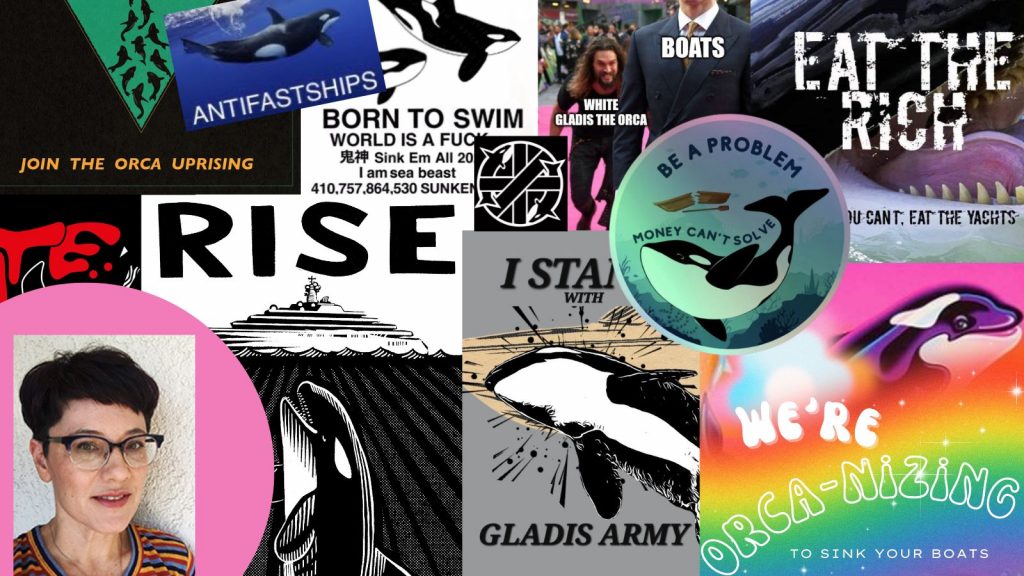
by Cybele Knowles
A month after a news article about boat-sinking orcas went viral, the killer whales have become full-fledged folk heroes. (Should that be “full-finned”? “Totally toothed”?) The stories we tell about the yacht-yeeting cetaceans express our desire to liberate ourselves from oppressive systems.
The #OrcaUprising, as it’s now widely called, has been underway for a while. The boat-sinking orcas were reported on as early as 2020, but the news didn’t go viral until LiveScience shared it in May 2023. Likely the article sparked our collective imagination because of a bit of poetry it contained. “A critical moment of agony,” (such as a boat strike or the loss of a calf) may have caused a matriarch whale named White Gladis to begin sinking ships, the article reported.
A critical moment of agony.
Nothing could be more relatable.
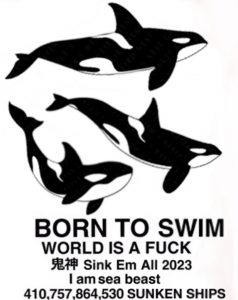
We don’t really know why the orcas are sinking ships — or how the behavior is spreading from one population of orcas to others. Maybe it’s just a new game. Maybe it is some form of self-defense. If so, scientists speculate that the behavior may have been kicked off not by one inciting incident (“moment of agony”), but an accumulation of human-caused stresses and dangers: entanglement and entrapment in fishing gear, collisions with ships, competition with the fishing industry for food, noise pollution, and possibly even physical attacks on orcas by humans.
There are stories of fishermen “stunning orca with electric prods, throwing lit petrol cans, cutting dorsal fins.” Just saying.
Another thing to say: The orcas who started sinking boats are from a small, critically endangered population. There may only be 35 of these orcas left in the world — and we are responsible for reducing them to that pitiful number. The current extinction crisis is “anthropogenic”: caused by us. Ninety-nine percent of currently threatened species are at risk from human activities, primarily those driving habitat loss, climate change, and introduction of non-native species.
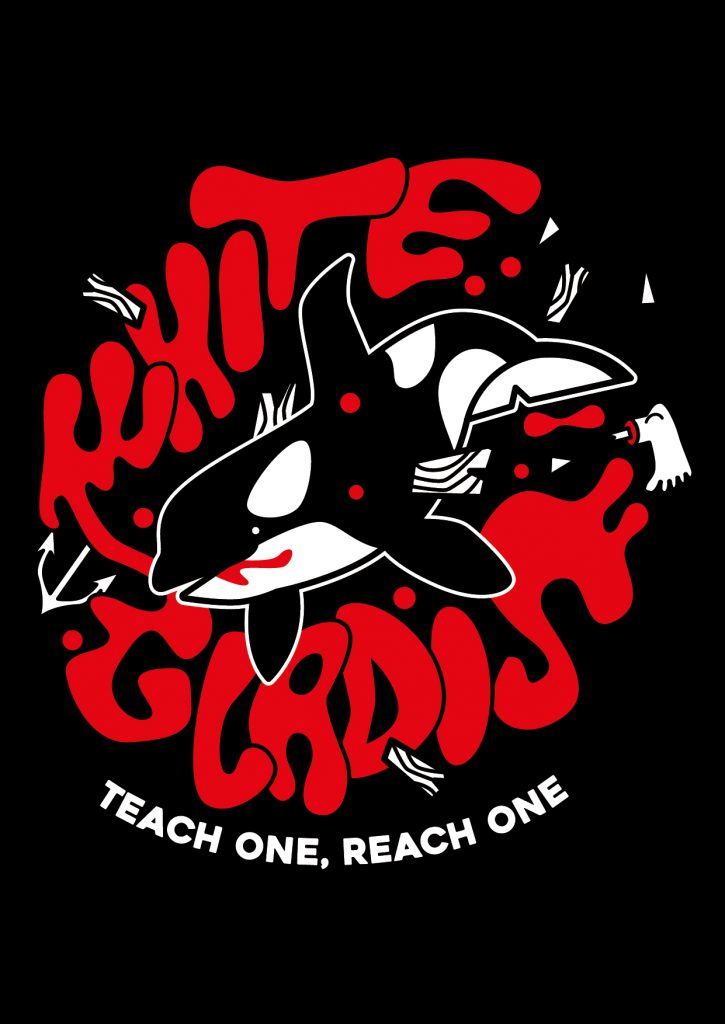
Many folk heroes began as real people whose traits and accomplishments were exaggerated to mythic proportions. Folk heroes often come to the rescue of ordinary people. Joan of Arc was a French warrior who defended her people against the British in the late Middle Ages. John Henry was a U.S. labor hero who stood up for workers against the new machines that threatened their livelihoods during the Age of Steam. (The real-life John Henry may have also been an advocate for prisoners, and an imprisoned person himself.)
And now, the orcas: sea beasts who sink yachts. Yachts, which aren’t just boats, but also symbols for a set of overlapping 21st-century horrors: the carnage of capitalism, including the climate emergency, extinction crisis, pollution and other forms of environmental destruction. The bone-chilling concentration of wealth into the hands of a very few, as well as the forms of destruction and oppression that enable this concentration: extractive industries, wage slavery, incarceration. The weakening of democracy. The popularization of fascistic, xenophobic, and white-supremacist ideologies.
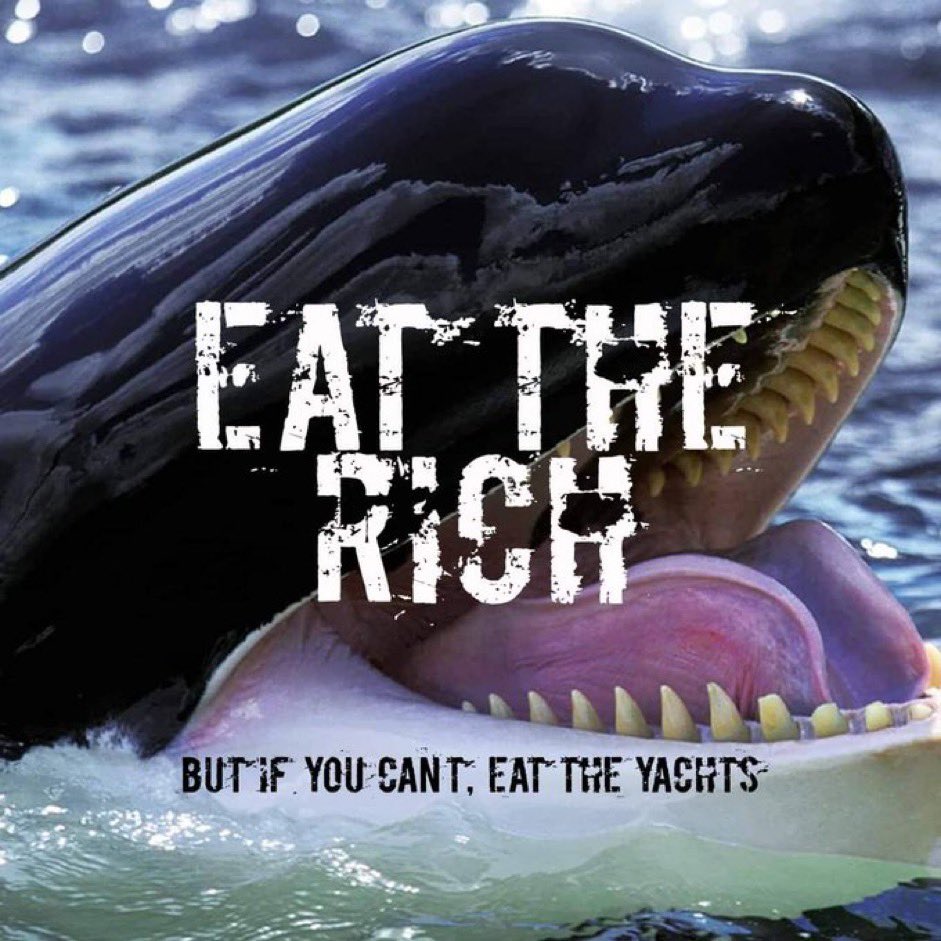
An article by Jacob Stern in The Atlantic admonishes, “Killer whales are not our friends: Stop rooting for the orcas ramming boats.” This piece provoked instant, merciless, thorough dragging of the author’s boat-y last name, CV, and attire. Any part of his person that is available to us, we have dunked on. Twitter user @BlameTag additionally brings a class analysis to the article by pointing out Laurene Powell Jobs, who owns The Atlantic, also owns a $120M yacht.
The Atlantic piece acknowledges but doesn’t honor what we’re doing with the orcas: making meaning of them. We’re not dealing in facts here, like the fact that by attacking boats, the orcas are putting themselves in even more danger of being targeted by humans. Or the fact a human may eventually get hurt — although to date there is not a single documented instance of a wild orca hurting a human. (Which demonstrates amazing restraint, if you ask me.)
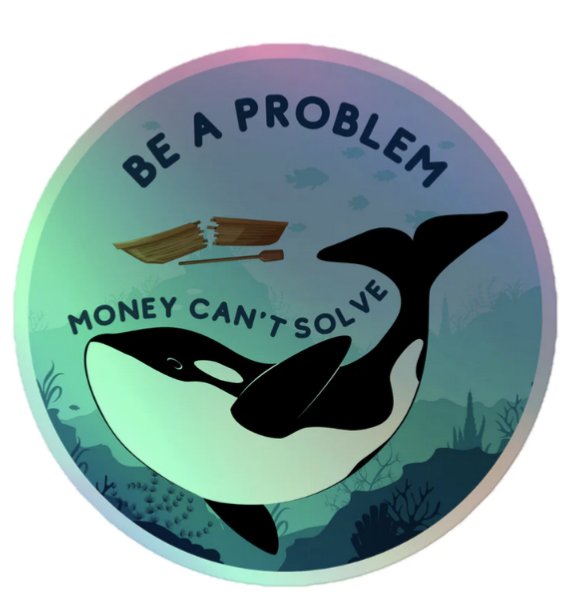
The internet is many things: an exploitative marketplace composed of overlapping corporate spaces where we’re both sold product and sold as product. A battlefield in the information wars for geopolitical dominance. And a site of folk culture. It’s the culture of a highly technological folk with a world of information at their fingertips, but folk nonetheless.
Orcas are our new folk heroes: a sustaining legend we’ve created in our time of need.

The possibility that orcas are fighting back provides catharsis for our sense that our world has become deeply unjust — unbearably so — and that no one is coming to help. Only bold action by us, for us (whether “us” is people or killer whales) can save the day, our species, all the species, the planet.
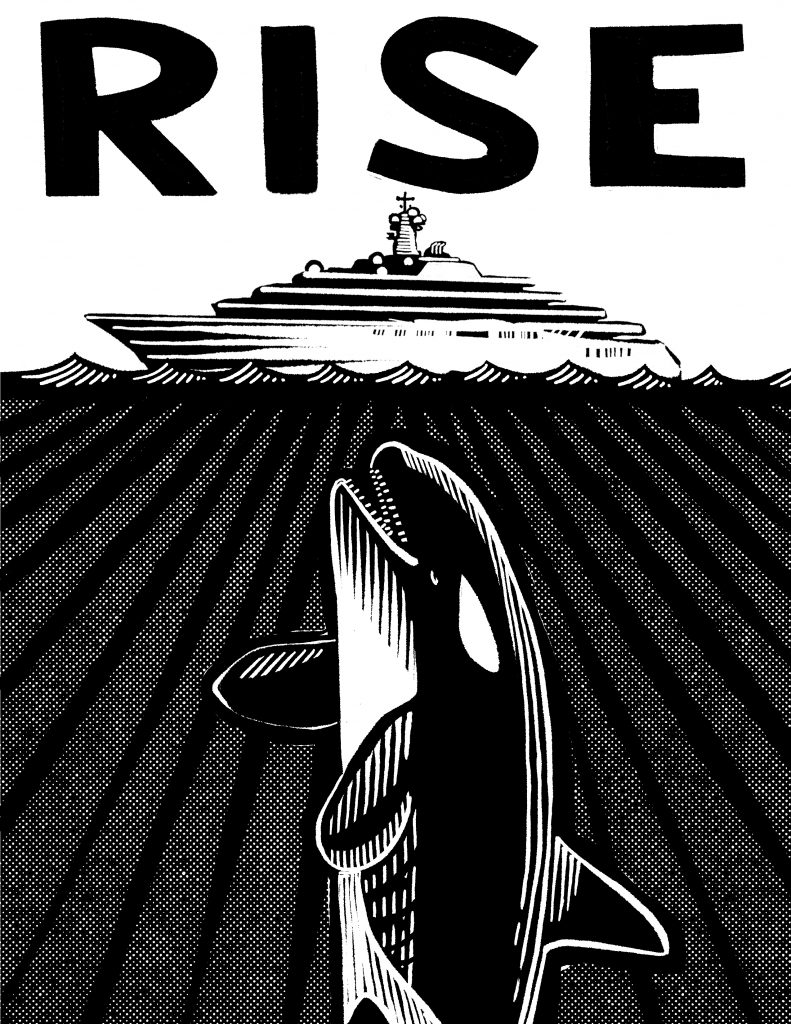
In the folk imagination, the ship-sinking orcas are linked to many current efforts, structures, and philosophies we turn to to help ourselves and each other. While scientists debate whether to call the transmission of the new ship-sinking behavior a “fad” like fish hats or “social learning,” Twitter user @jelenawoehr calls it grassroots organizing. The orcas are imagined as our allies in the labor movement, as in this tweet about David Zaslav, yacht owner and media exec embroiled in ongoing strikes by entertainment-industry workers. Methods of mutual aid such as bail funds and GoFundMe’s are proposed as support for the #OrcaUprising. Proliferating memes link the orcas to anarchy, socialism, anti-fascism, the Occupy movement, the fight against militarized borders, punk, prison abolition, and anti-capitalism.
Orcas are becoming the black-and-white face of justice movements that seek liberation over profit, the welfare of the many over the power of the few, and above all: life over death. Here’s a meme that brings an orca mascot into a critique of Elon Musk’s transphobia and billionaires taking doomed $250K trips to the wreck of the Titanic.
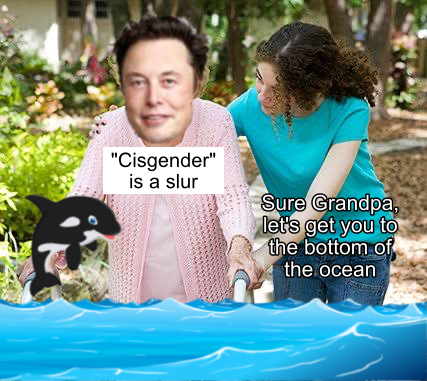
In the words of trans liberationist Leslie Feinberg, “My right to be me is tied by a thousand threads to your right to be you.” The orca folk hero says: No one is free until everyone is free.
So let’s keep biting off those rudders, sinking those ships, imagining resistance, and rising up.
View a collection of 50+ orca memes and tweets.
—————————–
Cybele Knowles is an editor and writer living and working in Tucson, Arizona.
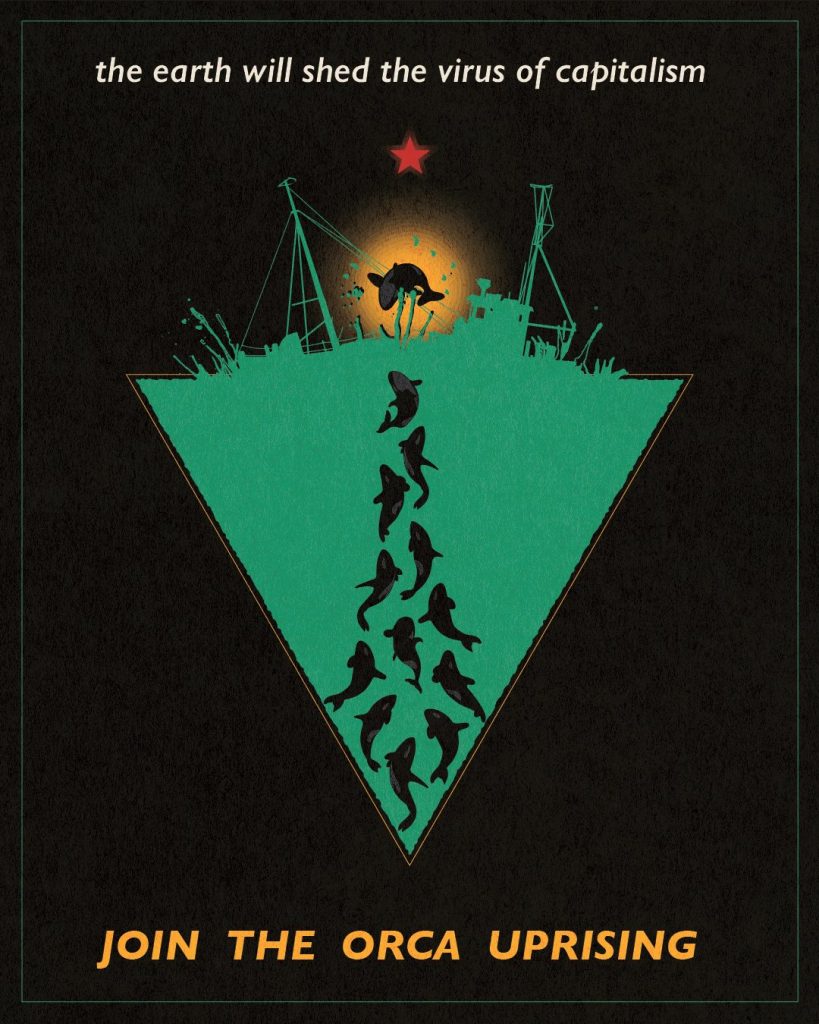
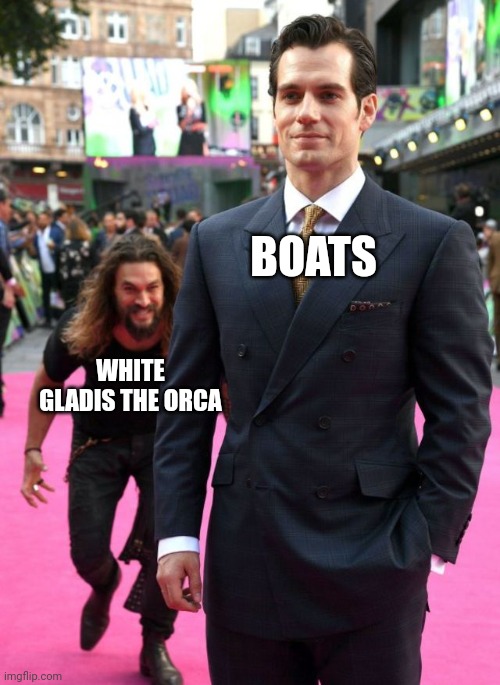
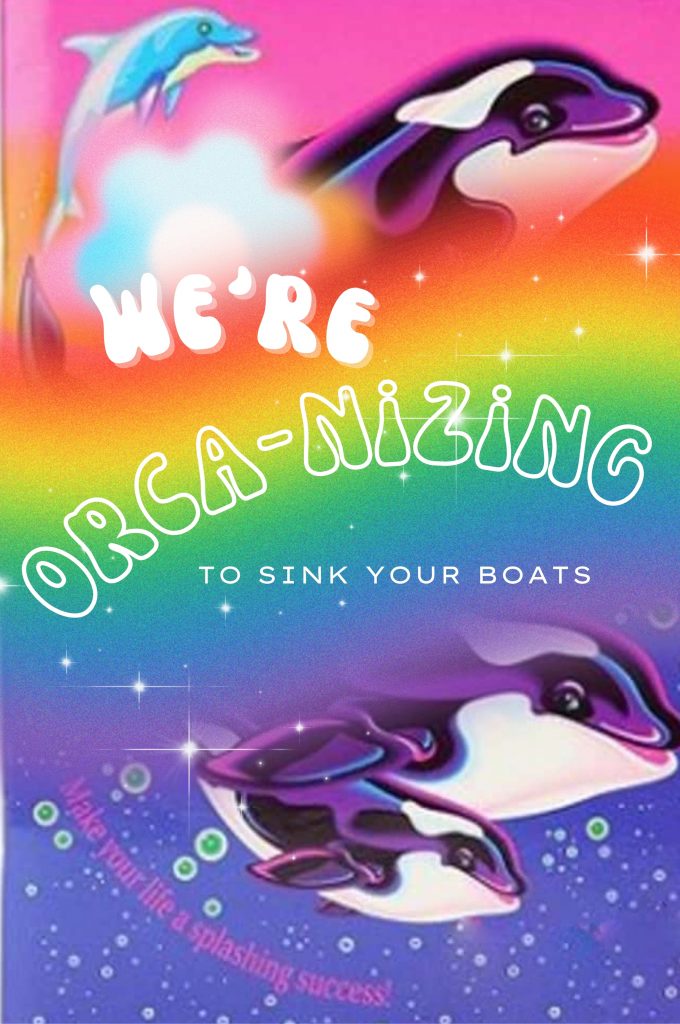
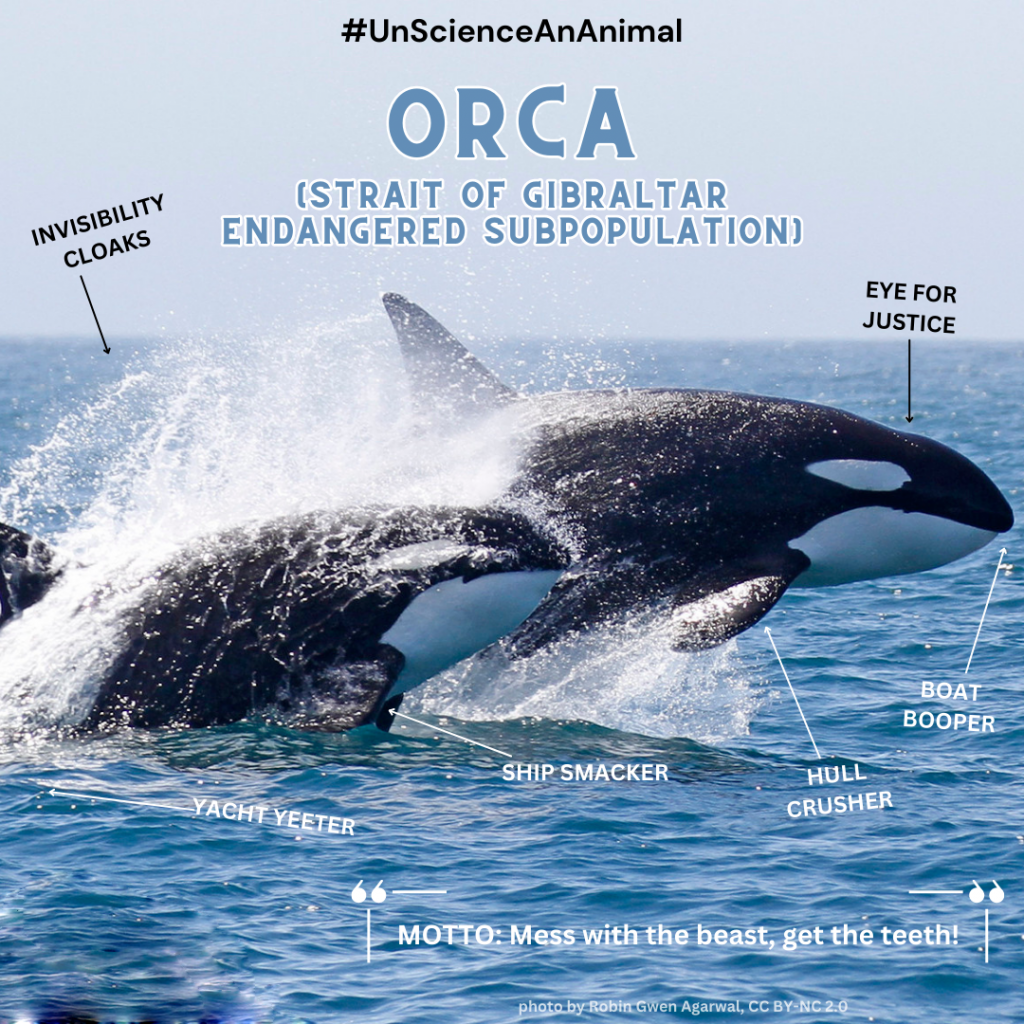
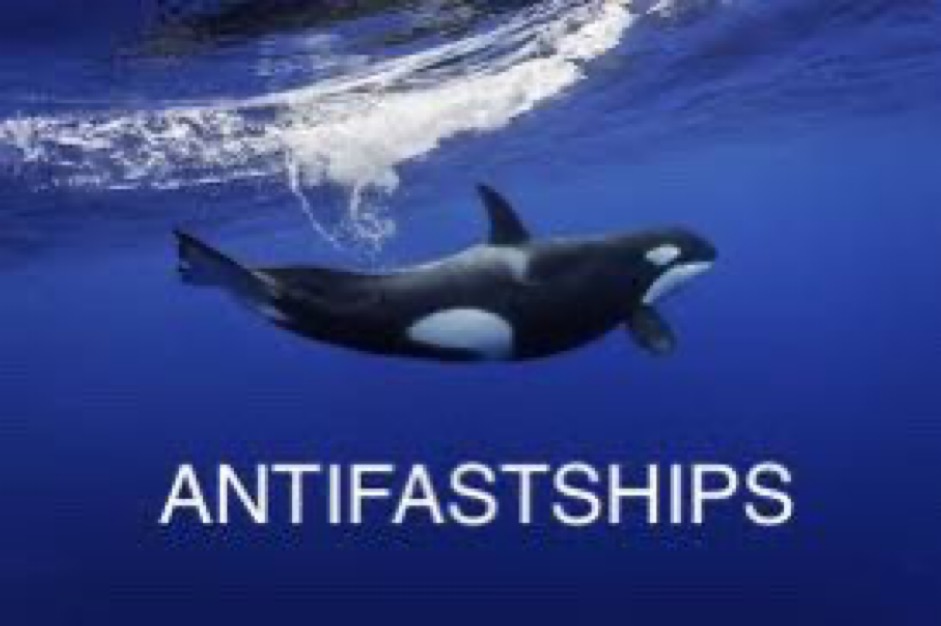
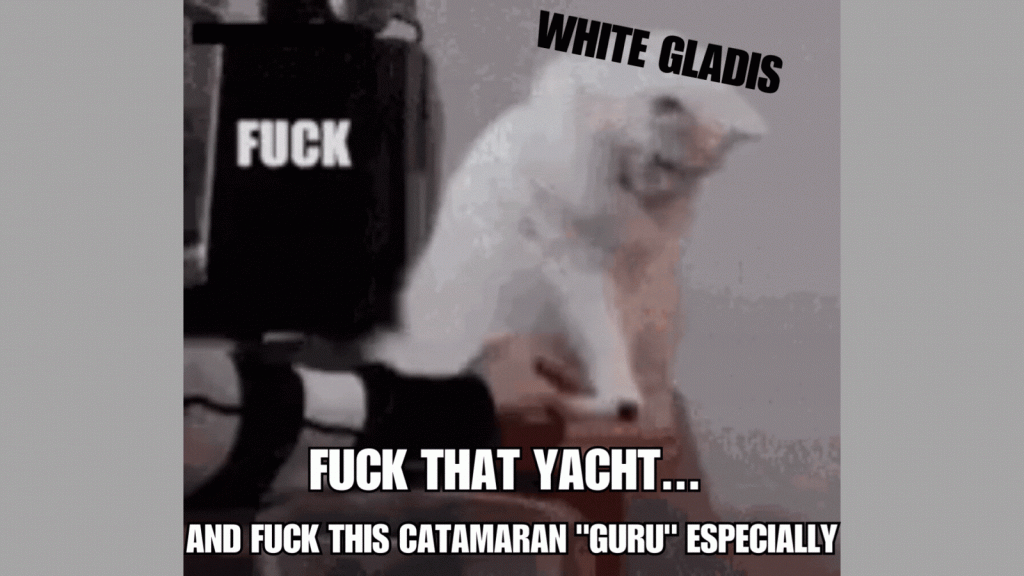

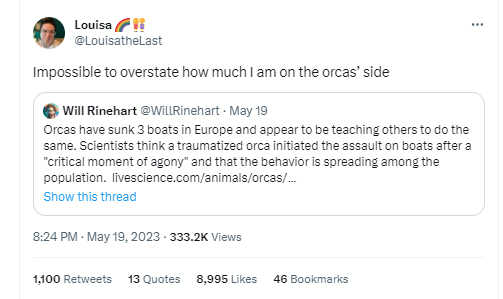
I support the orcas!
Go orcas!!! However, I have to add this:
I was an Earth First! activist and campaigner in the mid 1980s when the co-founders were all still with the group. All of the co-founders and those of us who put the Earth, its habitats & ecosystems, and native wildlife above all else were repulsed by the leftist element that began to take over our group, and eventually left. For me it wasn’t about agreement or disagreement with the leftists’ politics — except when they interfered with Earth First! ideals, like Judi Barry saying that we couldn’t spike trees and had to fight for the loggers’ jobs — but about priorities and focus. Politics is as much or more about priorities than anything, and if you take on other issues beside the Earth etc., 1) you will eventually end up on the wrong side of at least some issues; and 2) your focus on the environmental issues will be weakened.
I know I’m not going to change anyone’s mind about this, but you should at least really think about it. What triggered this comment was the Elon Musk picture. What in the world does the trans issue have to do with the natural environment? In fact, trans is totally UNNATURAL, and wouldn’t even exist if not for industrial society and modern technology, both of which any Earth First!er should strongly oppose. Again, this has nothing to do with which side I’m on, but does anyone seriously think that orcas give a damn about human gender issues (or any human social issues for that matter)?
Just came across this comment, sorry for the delayed reply. I think what you’re illustrating is largely why right-wing elements of EF! lost hold of the movement, and fractured it, by clinging to narrow ideas around gender, race, migration, etc. — ones that stem largely from biblical morality or conservative politics that are antithetical to the biocentrism EF! has always grounded in. Perhaps more than that, these narrow views are counterproductive to growing and supporting the movement of people who have rallied to the frontlines of the eco-wars.
Queer and trans people are present in pretty much any of the earliest histories of our species you look at, similar to how queerness — meaning non-hetero relations in general — is present in many other species untouched by industrialization. (And yes, species have also had biological changes stemming from chemicals from industrialism, but that’s a different conversation).
If your concern is with queer and/or trans people accessing modern medicine or therapy that they wish to utilize in pursuit of their healthcare needs, their personal freedom or the quality of life they desire… well, in order to not be bigotry, that conversation would have to take place in the context of all people also accessing these same things.
If you were still on the frontlines of ecological struggles, I think you would be happily embracing the queer and trans environmental activists at your side, and often far out front, putting their bodies on the line in the fights to stop pipelines, to protect forests, etc.
Many of the EF!ers of old didn’t leave with Foreman et al. And many more, like myself, have now been at it for the past 25+ years — with decades of involvement in EF! longer than many of those who jumped ship or turned tail after the conflicts and repression surrounding the late ’80s and early ’90s.
I hope you’ll be open to discussing and reconsidering your comment.
Pingback: Cybele Knowles: Boat-Sinking Orcas: Our New Folk Heroes - Agency
Pingback: Cybele Knowles: Boat-Sinking Orcas: Our New Folk Heroes – 🏴 Anarchist Federation